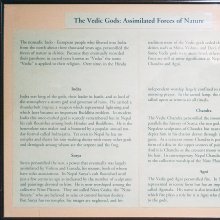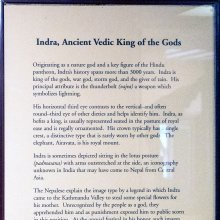Veda, Vedā: 42 definitions
Introduction:
Veda means something in Hinduism, Sanskrit, Jainism, Prakrit, Buddhism, Pali, the history of ancient India, Marathi, Hindi, biology. If you want to know the exact meaning, history, etymology or English translation of this term then check out the descriptions on this page. Add your comment or reference to a book if you want to contribute to this summary article.
Veda has 41 English definitions available.
Alternative spellings of this word include Ved.
Images (photo gallery)
(+13 more images available)
Languages of India and abroad
Sanskrit dictionary
[Deutsch Wörterbuch]
Source: Cologne Digital Sanskrit Dictionaries: Böhtlingk and Roth Grosses Petersburger WörterbuchVeḍa (वेड):—
1) n. = sāndravicchinnacandana [Rājanirghaṇṭa im Śabdakalpadruma] —
2) f. veḍā (beḍā) Boot, Schiff [Hemacandra’s Abhidhānacintāmaṇi 877] (veḍī v. l.). [Halāyudha 3, 50.]
--- OR ---
Veda (वेद):—1. (von 1. vid) m. gaṇa vṛṣādi zu [Pāṇini’s acht Bücher 6, 1, 203.]
1) Verständniss, theologische Kenntniss: yaḥ sa.idhā.ya āhutī.yo vedena dadāśa.marto a.naye . yo namasā svadhva.aḥ [Ṛgveda 8, 19, 5.] vedena rū.e vyapibatsutāsu.au pra.āpatiḥ [Vājasaneyisaṃhitā 19, 78.] [Aitareyabrāhmaṇa 7, 18.] —
2) das heilige Wissen, überliefert in der dreifachen Form (vgl. trayī vidyā) der Ṛc, Sāman und Yajus (dazu die Aṅgiras u. a.); später die bekannten Sammlungen der Ṛc, u. s. w.: die heilige Schrift; sg. [Amarakoṣa 3, 4, 14, 76. 18, 117. 22, 142.] [Hemacandra’s Abhidhānacintāmaṇi 249.] [Medinīkoṣa d. 15.] [Halāyudha 1, 9. 5, 82.] [Atharvavedasaṃhitā 7, 54, 2. 10, 8, 17. 15, 3, 7.] traya [The Śatapathabrāhmaṇa 5, 5, 5, 10. 13, 4, 3, 3.] [ĀŚV. GṚHY. 1, 15, 3.] [Yāska’s Nirukta 1, 2. 18. 20.] vedo khilo dharmamūlam [Manu’s Gesetzbuch 2, 6.] sarvajñānamaya [7.] śrutistu vedo vijñeyaḥ [10. 165.fg.] vedasya saṃhitā [11, 77.] vedaṃ viplāvya [198.] trivṛt [?263. fgg. pl. Atharvavedasaṃhitā 4, 35, 6. 19, 2, 12] (vedāḥ zu lesen). [Taittirīyasaṃhitā 7, 5, 11, 2.] vedā.vā e.e (diese drei Berge sind V.) a.a.tā vai vedāḥ [Taittirīyabrāhmaṇa 3, 10, 11, 4.] [Aitareyabrāhmaṇa 5, 32. 6, 15.] [The Śatapathabrāhmaṇa 11, 3, 3, 7. 12, 3, 4, 11. 14, 7, 3, 6. 9, 2, 4.] [ĀŚV. GṚHY. 3, 4, 1. 11, 1.] [ŚR. 10, 7.] [Manu’s Gesetzbuch 2, 97. 5, 4.] [Rāmāyaṇa 1, 1, 94. 4, 4.] vedaiḥ paśyanti vai dvijāḥ [Spr. (II) 2084.] satyapratiṣṭhānāḥ [2693.] vedeṣu śastreṣu ca [(I) 2270.] vedāḥ pramāṇaṃ smṛtayaḥ pramāṇam [5034.] (dhātuḥ) mukhato niḥsṛtānvedāṃhayagrīvo ntike harat [Bhāgavatapurāṇa 8, 24, 8.] vadānāṃ sāmavedo smi (sagt Kṛṣṇa) [Bhagavadgītā 10, 22.] praṇavaḥ sarvavedeṣu (ist Kṛṣṇa) [7, 8.] adhītya sarvavedān [Mahābhārata 13, 363.] trayo vedāḥ [Amarakoṣa 1, 1, 5, 4.] [Halāyudha 1, 8.] [The Śatapathabrāhmaṇa 10, 4, 2, 25.] [Manu’s Gesetzbuch 2, 77. 230.] [Mārkāṇḍeyapurāṇa 23, 36.] trivedasaṃyoga [Kātyāyana’s Śrautasūtrāṇi 25, 14, 37.] traya [Manu’s Gesetzbuch 2, 76.] trayī [Spr. (II) 2955.] vedānadhītya vedau vā vedaṃ vāpi [3, 2.] ekavedasyājñānādvedāste bahavaḥ kṛtāḥ (im Dvāpara) [Mahābhārata 3,11253. 5, 1663] (ekasya vedasyā mit der ed. Bomb. zu lesen). catvāraḥ [Hemacandra’s Abhidhānacintāmaṇi 253.] caturdhā veda eva ca (im Dvāpara) [Mahābhārata 3, 11251.] [Harivaṃśa 11516. 11668. fgg. 12436.] [Kathāsaritsāgara 38, 103. 118.] vyadadhādyajñasaṃtatyai vedamekaṃ caturvidham [Bhāgavatapurāṇa 1, 4, 19.] atharvāṅgirasaṃ vedam [6, 6, 19.] ātharvaṇaṃ caturthamitihāsapurāṇaṃ pañcamaṃ vedānāṃ vedam (= vyākaraṇa Comm.) [Chāndogyopaniṣad 7, 1, 2. 4.] caturo vedāṃsarvānākhyānapañcamān [Mahābhārata 3, 2247. 5, 1661.] ṛgyajuḥsāmātharvākhyā vedāścatvāra uddhṛtāḥ . itihāsapurāṇaṃ ca pañcamo veda ucyate .. [Bhāgavatapurāṇa 1, 4, 20.] purāṇaṃ pañcamo vedaḥ [Oxforder Handschriften 65,a,13.] a [The Śatapathabrāhmaṇa 14, 7, 1, 22.] yathāvedam [Kātyāyana’s Śrautasūtrāṇi 7, 1, 8.] eka adj. einen Veda habend —, kennend [Mahābhārata 3, 11244. 11252. 5, 1662.] dvi, tri, caturveda [3, 11251. fg. 5, 1661. fg.] [Kathāsaritsāgara 38, 102. 118.] Veda unter den Beinn. Viṣṇu’s [Śabdakalpadruma] nach dem [VIṢṆUSAHASRANĀMASTOTRA.] —
3) Bez. der Zahl vier [WEBER, Nakṣ. 2, 382, Nalopākhyāna 1.] [Jyotiṣa 101.] [Śrutabodha 13. 15. 39.] [Varāhamihira’s Bṛhajjātaka S. 77, 24.] [BṚH. 12, 1.] [Weber’s Indische Studien 8, 167.] [Sāhityadarpana 264.] —
4) das Empfinden [Vopadeva’s Grammatik 21, 10.] —
5) = vṛtta [Medinīkoṣa] vitta (vgl. 2. veda) v.l. nach [Śabdakalpadruma] — Vgl. atharva, āyurveda, ṛgveda, kṣatra, gandharva, caturveda, tri, durveda, dhanurveda, prativedam, brahmaveda, yajurveda, rātri, sāma .
--- OR ---
Veda (वेद):—2. (von 3. vid) m. Habe, Besitz: vedaṃ savitrā prasūtaṃ maghonām [ĀŚV. GṚHY. 1, 15,] [?1; vgl. u. 1.] veda 5).
--- OR ---
Veda (वेद):—3. m. gaṇa uñchādi zu [Pāṇini’s acht Bücher 6, 1, 160] (karaṇe) . ein Büschel starken Grases (Kuśa, Muñja) besenförmig gebunden, zum Fegen, Anfachen des Feuers u. s. w. gebraucht; = yajñāṅga [NĀNĀRTHARATNAM. im Śabdakalpadruma -] [Atharvavedasaṃhitā 7, 28, 1.] [Vājasaneyisaṃhitā 2, 21.] [Taittirīyasaṃhitā 1, 7, 4, 6. 2, 6, 3, 4.] [Taittirīyabrāhmaṇa 3, 3, 7, 2.] [The Śatapathabrāhmaṇa 1, 3, 1, 11. 9, 2, 1. 16. 22. fgg.] [Kāṭhaka-Recension 31, 7. 32, 6.] [Manu’s Gesetzbuch 4, 36.] [Aśvalāyana’s Śrautasūtrāni 1, 11, 1.] śiras [2.] tṛṇāni [4. 5. 9.] staraṇa [3, 6, 23.] [Kātyāyana’s Śrautasūtrāṇi 1, 3, 23. 10, 6. 2, 5, 25.] muñja [26, 2, 10. 5, 15.]
--- OR ---
Veda (वेद):—4.
1) m. Nomen proprium eines Ṛṣi [Harivaṃśa 9573] (vedagāthoṃ śumān die neuere Ausg. st. vedaścāthāṃśumān der älteren). ein Schüler Āyoda’s [Mahābhārata 1, 684.] —
2) f. ā Nomen proprium eines Flusses [Viṣṇupurāṇa 182,] [Nalopākhyāna 13.]
--- OR ---
Veda (वेद):—2. vgl. su .
Sanskrit, also spelled संस्कृतम् (saṃskṛtam), is an ancient language of India commonly seen as the grandmother of the Indo-European language family (even English!). Closely allied with Prakrit and Pali, Sanskrit is more exhaustive in both grammar and terms and has the most extensive collection of literature in the world, greatly surpassing its sister-languages Greek and Latin.
See also (Relevant definitions)
Starts with (+697): Veda Bagada, Veda Dhotara, Veda Khula, Veda Madhura, Veda Pira, Veda Sanman, Veda Usa, Veda Vankada, Veda Vidra, Veda-matha, Veda-parayana, Veda-vritti, Vedabagada, Vedabahira, Vedabahirate, Vedabahu, Vedabahya, Vedabandhu, Vedabbha, Vedabbha Jataka.
Ends with (+135): Adhitaveda, Adhiveda, Adhoveda, Adhvaryuveda, Agadaveda, Anandaveda, Anaveda, Anirveda, Antahsveda, Anubhavaveda, Anuveda, Apratisamveda, Apraveda, Ardhaveda, Ashmaghanasveda, Ashvayurveda, Astraveda, Asveda, Atharvanaveda, Atharvaveda.
Full-text (+19772): Vaidika, Vedas, Shruti, Vedanta, Vedanga, Brahmana, Svadhyaya, Chandasa, Triveda, Brahma, Vedokta, Brahmayajna, Vedadhigama, Vedaparaga, Brahmaveda, Karmakanda, Vedajna, Nigama, Rigveda, Vedavid.
Relevant text
Search found 352 books and stories containing Veda, Vedā, Vēda, Veḍa, Veḍā, Vēḍa, Vēḍā, Vedic, Vaeda; (plurals include: Vedas, Vedās, Vēdas, Veḍas, Veḍās, Vēḍas, Vēḍās, Vedics, Vaedas). You can also click to the full overview containing English textual excerpts. Below are direct links for the most relevant articles:
Historical Elements in the Matsya Purana (by Chaitali Kadia)
Relation between History and Purāṇa < [Chapter 2 - History and Historical elements]
Ancient Depictions of the Purāṇas < [Chapter 1 - An Introduction of the Purāṇas]
An Introduction of the Purāṇas < [Chapter 1 - An Introduction of the Purāṇas]
A History of Indian Philosophy Volume 2 (by Surendranath Dasgupta)
Part 1 - Āyurveda and the Atharva-veda < [Chapter XIII - Speculations in the Medical Schools]
Part 12 - Bhāgavata and the Bhagavad-gita < [Chapter XIV - The Philosophy of the Bhagavad-gītā]
Part 6 - Conception of Sacrificial Duties in the Gītā < [Chapter XIV - The Philosophy of the Bhagavad-gītā]
Women in the Atharva-veda Samhita (by Pranab Jyoti Kalita)
1. Derivation and Meaning of the Term Veda < [Chapter 1 - The Atharvaveda and its importance in the Vedic Literature]
6. Importance of the Atharvaveda in the Vedic Literature < [Chapter 1 - The Atharvaveda and its importance in the Vedic Literature]
13. Goddess Medhā < [Chapter 4 - Female Deities and the Glorification of Women in the Atharvaveda]
The Sacrifices of Rajasuya, Vajapeya and Ashvamedha (study) (by Aparna Dhar)
Introduction to Vedic literature < [Chapter 1 - A brief outline of the Brāhmaṇa Literature]
Śrauta and Gṛhya Karma < [Chapter 2 - Vedic Sacrifices described in the Śatapatha Brāhmaṇa]
Only Tri-Varṇa has the right to perform Vedic Sacrifice < [Chapter 2 - Vedic Sacrifices described in the Śatapatha Brāhmaṇa]
The Markandeya Purana (Study) (by Chandamita Bhattacharya)
1.1: Introduction to the Purāṇa Literature < [Chapter 1]
1.4: Date of the Purāṇas < [Chapter 1]
Divisions of Āśrama (a): Brahmacarya < [Chapter 2]
Prasthanatrayi Swaminarayan Bhashyam (Study) (by Sadhu Gyanananddas)
4.4g. The Vedic Texts < [Chapter 2 - Analysis on the Basis Of Epistemology]
3. Vedic Darśana Tradition and the Prasthānatrayī Śāstras < [Chapter 1 - Introduction]
6. Prasthānatrayī-Svāminarāyana-Bhāṣya < [Chapter 1 - Introduction]
Related products
(+43 more products available)










